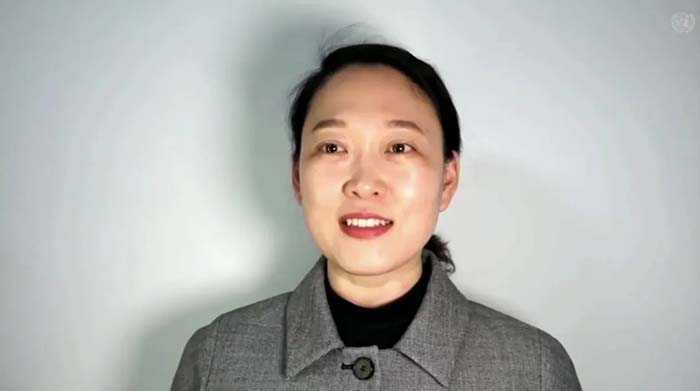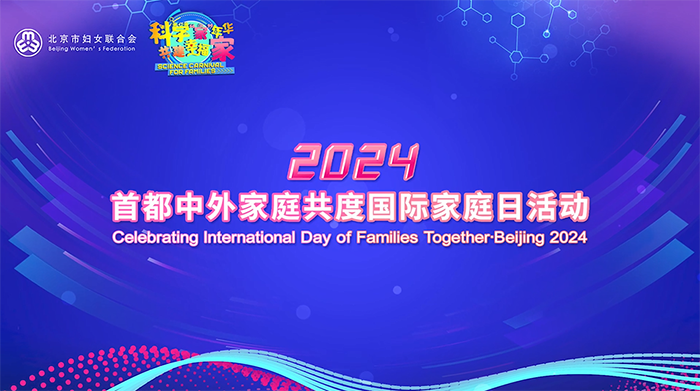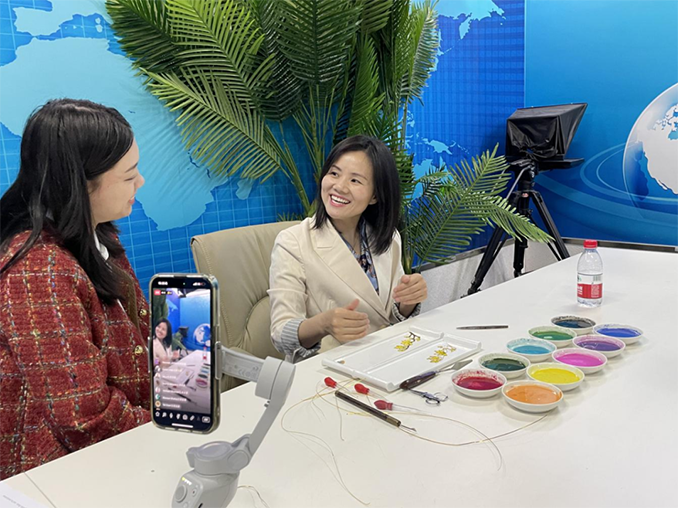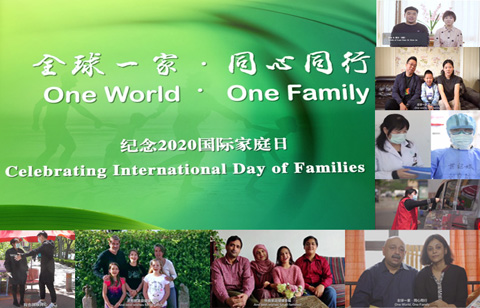Online Classes Promote Development of Women's Handicraft Industry
Date:2021-8-22 9:13:14 Views: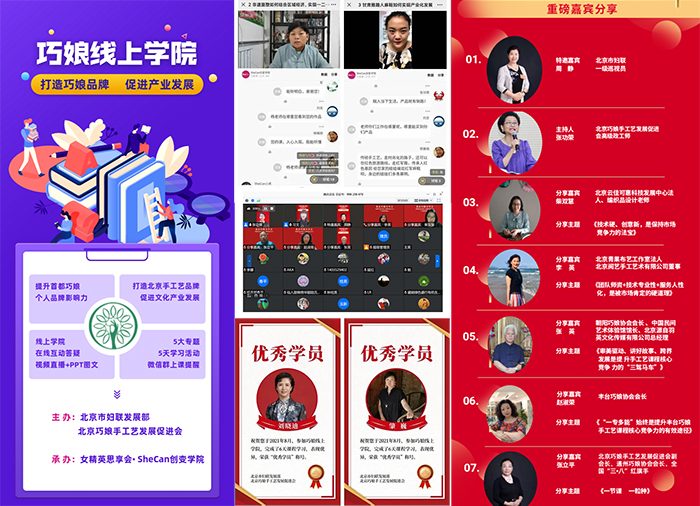
Beijing Women's Federation (BWF) holds online classes to train women in the handicraft industry.
Sponsored by the Women's Development Department of the Beijing Women's Federation (BWF), the Beijing Qiaoniang (Smart Lady) Handicraft Development Association and organized by Female Elite Sharing (an organization dedicated to women's development), online training activities were held from August 2 to 7 through a live-streaming platform.
The organizers created a WeChat account group composed of 176 people. They invited five experts, including a post-doctoral fellow from Tsinghua University, a businesswoman conferred with the title of "Women Pacesetters for Achievements," a corporate founder and a CEO, to give live-streamed lectures. Trainees took courses on five themes — brand building, product innovation, marketing, industrial development and competitiveness enhancement, covering frontier vision and practical cases. According to statistics, 324 people participated in the courses for 1,746 times, conducting 418 check-in and post updates.
Bao Yongxing, a lecturer at the Kuaishou Creator Academy, taught a lesson on how craftspeople use short videos and live-streaming to conduct marketing. Guo Juan, general manager of a jute fiber-woven products company in Northwest China's Gansu Province, shared her experience on how her company realized the industrial development. Yang Fan, an inheritor of the intangible cultural heritage dough sculpting, shared how to integrate dough sculpting with the regional economy to realize the three-dimensional development of three industries. Wang Jiajing, director of the Creative Project Department of Tsinghua Institute of Cultural and Creativity, gave a lecture on the opportunities and challenges of cultural and creative brands with the rise of hip, homegrown brands, which broadened participants' theoretical thinking. To help grasp the opportunity of WeChat video accounts and enhance influence and competitiveness, Kuang Zimin, a personal brand coach of Chinese entrepreneurs, taught trainees how to use WeChat video accounts to build personal brands, and answered questions related to trainees' projects.
As part of the training, a themed meeting on how to improve the core competitiveness of the Beijing Qiaoniang (Smart lady) handicraft course was organized. Five guests put forward their own opinions from their respective perspectives. Chai Shuanghui, legal representative of Beijing Yunjia Kehui Technology Center, shared about the idea that technology and creativity are weapons which help maintain market competitiveness. Li Ying, legal representative of Beijing Qingguo Cloth Art Studio, explained why a team of experts, technical professionalism and humanized services are important to be recognized in the market. Zhang Ying, curator of the Chinese Folk Art Museum, believed that aesthetics, good storytelling, and cross-border development are the "troika" that enhances the core competitiveness of the Beijing Qiaoniang handicraft course. Zhao Shurong, president of the Fengtai Qiaoniang Association, believed that craftswomen should develop capabilities in various fields to improve their training courses' competitiveness. Zhang Liping, vice-president of the Beijing Qiaoniang Handicraft Development Association, also gave a lecture. The five lectures selflessly shared their valuable experience, and provided reference and direction for helping Beijing Qiaoniang improve their core competitiveness.
In June of this year, the Ministry of Education clearly stipulated that off-campus training institutions shall not be involved in subject training. This has made a huge space for a bigger and stronger Beijing Qiaoniang handicraft training market, and provided an opportunity for development.
Zhou Jing, an inspector of BWF, emphasized during the live-streaming that the two-wheel-drive business model of "selling products" and "selling courses" has given today's Beijing Qiaoniang a bigger stage and helped them gain more respect. More than 80% of the annual income of some Qiaoniang studios comes from "selling courses," which indicates that handicraft courses have become a competitive product with more market prospects. From discovering the changes of Beijing Qiaoniang's business model, visiting Qiaoniang's studio to holding small seminars and training, the Beijing Qiaoniang Handicraft Development Association has played a positive role in leading, assisting and , which is the focus of the BWF's efforts in cultivating women's social organizations.
The online training, through live-streamed classes and WeChat-based communications, enabled all trainees to learn at home during the COVID-19 epidemic. During the 6-day study, the rich learning methods made trainees remain enthusiastic. They said that they learned a lot and had innovative ideas about the market. "Every day of study brings new gains." "Thanks to the wonderful explanations of the teachers, I have obtained a lot of knowledge." "We must make persistent efforts to transform knowledge into productivity, push handicrafts to keep up with the times." Trainees left messages in their WeChat learning groups. After the course, in order to commend outstanding trainees, 10 outstanding students were selected based on their performance, with an electronic certificate issued to them.
The online training course used online learning methods to broaden Beijing Qiaoniang's business horizons, enhance their comprehensive qualifications and promote the innovation and development of traditional handicrafts. It represents women's strength in the transformation and upgrading of Beijing's cultural industry.
